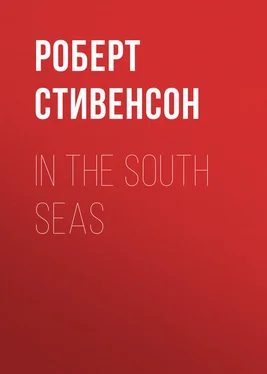Роберт Стивенсон - In the South Seas
Здесь есть возможность читать онлайн «Роберт Стивенсон - In the South Seas» — ознакомительный отрывок электронной книги совершенно бесплатно, а после прочтения отрывка купить полную версию. В некоторых случаях можно слушать аудио, скачать через торрент в формате fb2 и присутствует краткое содержание. Жанр: literature_19, foreign_antique, foreign_prose, Путешествия и география, на английском языке. Описание произведения, (предисловие) а так же отзывы посетителей доступны на портале библиотеки ЛибКат.
- Название:In the South Seas
- Автор:
- Жанр:
- Год:неизвестен
- ISBN:нет данных
- Рейтинг книги:5 / 5. Голосов: 1
-
Избранное:Добавить в избранное
- Отзывы:
-
Ваша оценка:
- 100
- 1
- 2
- 3
- 4
- 5
In the South Seas: краткое содержание, описание и аннотация
Предлагаем к чтению аннотацию, описание, краткое содержание или предисловие (зависит от того, что написал сам автор книги «In the South Seas»). Если вы не нашли необходимую информацию о книге — напишите в комментариях, мы постараемся отыскать её.
In the South Seas — читать онлайн ознакомительный отрывок
Ниже представлен текст книги, разбитый по страницам. Система сохранения места последней прочитанной страницы, позволяет с удобством читать онлайн бесплатно книгу «In the South Seas», без необходимости каждый раз заново искать на чём Вы остановились. Поставьте закладку, и сможете в любой момент перейти на страницу, на которой закончили чтение.
Интервал:
Закладка:
Robert Louis Stevenson
In the South Seas Being an Account of Experiences and Observations in the Marquesas, Paumotus and Gilbert Islands in the Course of Two Cruises on the Yacht «Casco» (1888) and the Schooner «Equator» (1889)
PART 1: THE MARQUESAS
CHAPTER I – AN ISLAND LANDFALL
For nearly ten years my health had been declining; and for some while before I set forth upon my voyage, I believed I was come to the afterpiece of life, and had only the nurse and undertaker to expect. It was suggested that I should try the South Seas; and I was not unwilling to visit like a ghost, and be carried like a bale, among scenes that had attracted me in youth and health. I chartered accordingly Dr. Merrit’s schooner yacht, the Casco , seventy-four tons register; sailed from San Francisco towards the end of June 1888, visited the eastern islands, and was left early the next year at Honolulu. Hence, lacking courage to return to my old life of the house and sick-room, I set forth to leeward in a trading schooner, the Equator , of a little over seventy tons, spent four months among the atolls (low coral islands) of the Gilbert group, and reached Samoa towards the close of ’89. By that time gratitude and habit were beginning to attach me to the islands; I had gained a competency of strength; I had made friends; I had learned new interests; the time of my voyages had passed like days in fairyland; and I decided to remain. I began to prepare these pages at sea, on a third cruise, in the trading steamer Janet Nicoll . If more days are granted me, they shall be passed where I have found life most pleasant and man most interesting; the axes of my black boys are already clearing the foundations of my future house; and I must learn to address readers from the uttermost parts of the sea.
That I should thus have reversed the verdict of Lord Tennyson’s hero is less eccentric than appears. Few men who come to the islands leave them; they grow grey where they alighted; the palm shades and the trade-wind fans them till they die, perhaps cherishing to the last the fancy of a visit home, which is rarely made, more rarely enjoyed, and yet more rarely repeated. No part of the world exerts the same attractive power upon the visitor, and the task before me is to communicate to fireside travellers some sense of its seduction, and to describe the life, at sea and ashore, of many hundred thousand persons, some of our own blood and language, all our contemporaries, and yet as remote in thought and habit as Rob Roy or Barbarossa, the Apostles or the Cæsars.
The first experience can never be repeated. The first love, the first sunrise, the first South Sea island, are memories apart and touched a virginity of sense. On the 28th of July 1888 the moon was an hour down by four in the morning. In the east a radiating centre of brightness told of the day; and beneath, on the skyline, the morning bank was already building, black as ink. We have all read of the swiftness of the day’s coming and departure in low latitudes; it is a point on which the scientific and sentimental tourist are at one, and has inspired some tasteful poetry. The period certainly varies with the season; but here is one case exactly noted. Although the dawn was thus preparing by four, the sun was not up till six; and it was half-past five before we could distinguish our expected islands from the clouds on the horizon. Eight degrees south, and the day two hours a-coming. The interval was passed on deck in the silence of expectation, the customary thrill of landfall heightened by the strangeness of the shores that we were then approaching. Slowly they took shape in the attenuating darkness. Ua-huna, piling up to a truncated summit, appeared the first upon the starboard bow; almost abeam arose our destination, Nuka-hiva, whelmed in cloud; and betwixt and to the southward, the first rays of the sun displayed the needles of Ua-pu. These pricked about the line of the horizon; like the pinnacles of some ornate and monstrous church, they stood there, in the sparkling brightness of the morning, the fit signboard of a world of wonders.
Not one soul aboard the Casco had set foot upon the islands, or knew, except by accident, one word of any of the island tongues; and it was with something perhaps of the same anxious pleasure as thrilled the bosom of discoverers that we drew near these problematic shores. The land heaved up in peaks and rising vales; it fell in cliffs and buttresses; its colour ran through fifty modulations in a scale of pearl and rose and olive; and it was crowned above by opalescent clouds. The suffusion of vague hues deceived the eye; the shadows of clouds were confounded with the articulations of the mountains; and the isle and its unsubstantial canopy rose and shimmered before us like a single mass. There was no beacon, no smoke of towns to be expected, no plying pilot. Somewhere, in that pale phantasmagoria of cliff and cloud, our haven lay concealed; and somewhere to the east of it – the only sea-mark given – a certain headland, known indifferently as Cape Adam and Eve, or Cape Jack and Jane, and distinguished by two colossal figures, the gross statuary of nature. These we were to find; for these we craned and stared, focused glasses, and wrangled over charts; and the sun was overhead and the land close ahead before we found them. To a ship approaching, like the Casco , from the north, they proved indeed the least conspicuous features of a striking coast; the surf flying high above its base; strange, austere, and feathered mountains rising behind; and Jack and Jane, or Adam and Eve, impending like a pair of warts above the breakers.
Thence we bore away along shore. On our port beam we might hear the explosions of the surf; a few birds flew fishing under the prow; there was no other sound or mark of life, whether of man or beast, in all that quarter of the island. Winged by her own impetus and the dying breeze, the Casco skimmed under cliffs, opened out a cove, showed us a beach and some green trees, and flitted by again, bowing to the swell. The trees, from our distance, might have been hazel; the beach might have been in Europe; the mountain forms behind modelled in little from the Alps, and the forest which clustered on their ramparts a growth no more considerable than our Scottish heath. Again the cliff yawned, but now with a deeper entry; and the Casco , hauling her wind, began to slide into the bay of Anaho. The cocoa-palm, that giraffe of vegetables, so graceful, so ungainly, to the European eye so foreign, was to be seen crowding on the beach, and climbing and fringing the steep sides of mountains. Rude and bare hills embraced the inlet upon either hand; it was enclosed to the landward by a bulk of shattered mountains. In every crevice of that barrier the forest harboured, roosting and nestling there like birds about a ruin; and far above, it greened and roughened the razor edges of the summit.
Under the eastern shore, our schooner, now bereft of any breeze, continued to creep in: the smart creature, when once under way, appearing motive in herself. From close aboard arose the bleating of young lambs; a bird sang in the hillside; the scent of the land and of a hundred fruits or flowers flowed forth to meet us; and, presently, a house or two appeared, standing high upon the ankles of the hills, and one of these surrounded with what seemed a garden. These conspicuous habitations, that patch of culture, had we but known it, were a mark of the passage of whites; and we might have approached a hundred islands and not found their parallel. It was longer ere we spied the native village, standing (in the universal fashion) close upon a curve of beach, close under a grove of palms; the sea in front growling and whitening on a concave arc of reef. For the cocoa-tree and the island man are both lovers and neighbours of the surf. ‘The coral waxes, the palm grows, but man departs,’ says the sad Tahitian proverb; but they are all three, so long as they endure, co-haunters of the beach. The mark of anchorage was a blow-hole in the rocks, near the south-easterly corner of the bay. Punctually to our use, the blow-hole spouted; the schooner turned upon her heel; the anchor plunged. It was a small sound, a great event; my soul went down with these moorings whence no windlass may extract nor any diver fish it up; and I, and some part of my ship’s company, were from that hour the bondslaves of the isles of Vivien.
Читать дальшеИнтервал:
Закладка:
Похожие книги на «In the South Seas»
Представляем Вашему вниманию похожие книги на «In the South Seas» списком для выбора. Мы отобрали схожую по названию и смыслу литературу в надежде предоставить читателям больше вариантов отыскать новые, интересные, ещё непрочитанные произведения.
Обсуждение, отзывы о книге «In the South Seas» и просто собственные мнения читателей. Оставьте ваши комментарии, напишите, что Вы думаете о произведении, его смысле или главных героях. Укажите что конкретно понравилось, а что нет, и почему Вы так считаете.












